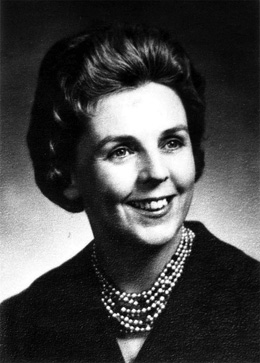On January 24, 1975, former Washington State Representative Marjorie Lynch (1920-1977) is sworn in as Deputy Administrator of the American Revolution Bicentennial Administration. Lynch's nomination to the post has caused a political storm after the Daughters of the American Revolution (DAR) charged that it was unpatriotic for the position to be filled by a London-born naturalized U.S. citizen. Lynch met her future husband, a U.S. Army doctor from Yakima, while serving in the Royal Air Force during World War II, and moved with him to the Central Washington city where, while raising three daughters, she became a respected community leader and a rising figure in the Republican Party.
Planning to Celebrate
In 1966, Congress created the American Revolution Bicentennial Commission to prepare an overall goal for the celebration of the upcoming 200th anniversary of the American Revolution. The group met infrequently until 1969, but then got mired in debate when commissioners focused on creating a single celebratory event, but could not decide on whether to hold it in Washington, Boston, or Philadelphia.
The commission also came under fire for projected costs of the event, and for the perception that the bicentennial was becoming too politicized and over-commercialized. Congress dissolved the commission in December 1973, and replaced it with the American Revolution Bicentennial Administration (ARBA). On March 11, 1974, President Richard Nixon (1913-1994) nominated John Warner (b. 1927), then Secretary of the Navy (and later a five-term U.S. senator from Virginia), to serve as ARBA's administrator.
Later that year Nixon resigned under threat of impeachment due to the Watergate scandal, and Vice President Gerald Ford (1913-2006) assumed the presidency and was sworn in on August 9, 1974. Throwing his support behind ARBA, in October he nominated Marjorie Lynch -- a former Washington state representative from Yakima -- as ARBA's deputy administrator, to assist Warner and the administration in planning the bicentennial.
Controversy
From 1961 to 1971, Lynch represented the 14th Legislative District, located in Yakima County, in the Washington State Legislature. Since that time, she had worked for ACTION, the federal agency coordinating volunteer programs. Lynch was well-liked within the Republican Party, and her nomination was believed to be a safe choice, but a controversy quickly developed when the Daughters of the American Revolution (DAR) questioned her heritage.
Lynch was born in London, and served in the Royal Air Force during World War II. While in France she met and married Dr. Edward Donald Lynch (1912-2007), a U.S. Army medical officer from Yakima. After the war she moved with him to Yakima, and became a naturalized citizen in 1948. Because she was not born on American soil, the DAR filed a formal protest against her nomination.
Lynch was disappointed that her patriotism was called into question. John Warner deplored the idea that there were two classes of citizen, foreign-born and native-born. U.S. Representative Joel Pritchard of Seattle called the DAR's opposition, "narrow, insensitive, and ill-conceived," and noted that "The primary purpose of the Revolution was to give all people in the country the opportunity to express themselves freely. We shouldn't try to deny someone that opportunity 200 years later" ("DAR Blasted ...").
Confirmed
Support for Lynch was widespread. Both of Washington's Democratic U.S. senators spoke in her favor, as did the state's Republican governor. Senator Henry Jackson (1912-1983) told the senate hearing on the nomination, "Perhaps the British ought to be represented since 18 signers of the Declaration of Independence were born in England," Senator Warren Magnuson (1905-1989) also issued a strong statement in favor of her nomination, and Governor Dan Evans (1925-2024) sent a telegram stating that Lynch was "completely dedicated to the United States" ("Bicentennial Leader ...").
Lynch also voiced her own opinion, telling lawmakers, "The tenets of American democracy are particularly cherished when you are not born to them but with deliberation and conviction adopt them for your own" ("British-Born 'Rebel' ..."). Her appointment was approved after two tries, and she began work in late 1974.
On January 24, 1975, Lynch was officially sworn in as Deputy Administrator of the American Revolution Bicentennial Administration by Vice-President Nelson Rockefeller (1905-1996), who noted that their friendship went back to 1953, when she was vice-chair of the Yakima County Republican Club and he had joined the Eisenhower administration. Rockefeller also expressed his belief that Lynch would be instrumental in creating a bicentennial commemoration befitting the nation.
Lynch eventually smoothed over any hard feelings the DAR had, and was even invited to speak at the group's national convention in 1975. She later noted that in America, "We really are able to disagree, and when it's all over, be able to accept" ("Despite Battles, Bicentennial "Shaping Up'").
The Bicentennial Administration planned and organized a series of commemorative events around the country between March 1975 and December 1976. As deputy administrator, and with Warner traveling much of the time, Lynch was in charge of the yearly $10 million budget and handled personnel and other administrative issues. After the Bicentennial celebrations wound down, Lynch served as undersecretary of Health, Education, and Welfare (HEW) and briefly as an official at the University of Alabama, before succumbing to cancer in 1977.

